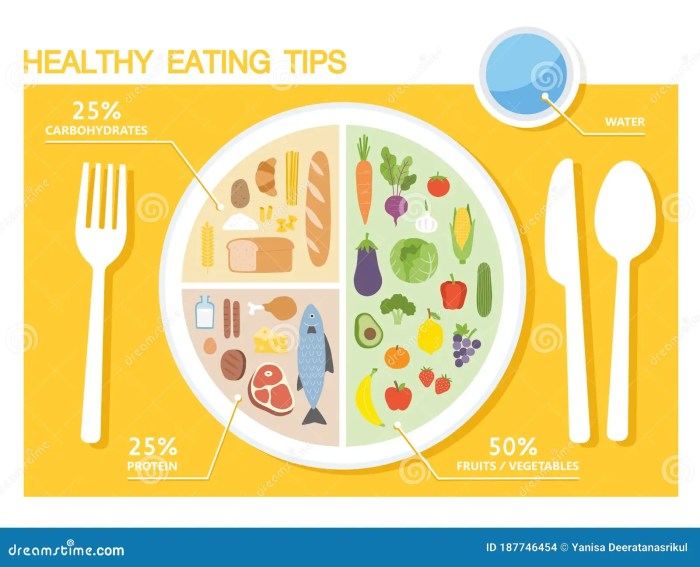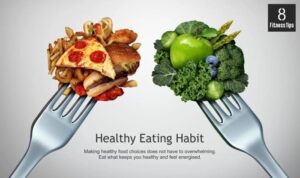Balanced Diet Tips take the spotlight in this guide that’s all about keeping your health in check, so grab your smoothie and let’s dive in!
From the importance of a balanced diet to meal planning and preparation, get ready to revamp your eating habits with these essential tips.
Importance of a Balanced Diet: Balanced Diet Tips
Eating a balanced diet is crucial for overall health as it provides the necessary nutrients our bodies need to function properly. This means consuming a variety of foods in appropriate portions to ensure we get all the essential vitamins, minerals, and macronutrients.
Benefits of Maintaining a Balanced Diet
- Improved Energy Levels: A balanced diet helps regulate blood sugar levels, providing a steady source of energy throughout the day.
- Weight Management: By eating a balanced diet, you can maintain a healthy weight and reduce the risk of obesity-related health issues.
- Better Digestive Health: Consuming a variety of fruits, vegetables, whole grains, and lean proteins supports digestive function and gut health.
- Stronger Immune System: Nutrient-rich foods help boost the immune system, reducing the risk of infections and illnesses.
Prevention of Health Issues with a Balanced Diet
- Heart Disease: Eating a balanced diet low in saturated fats and cholesterol can reduce the risk of heart disease and high blood pressure.
- Diabetes: Maintaining a healthy diet can help prevent or manage type 2 diabetes by regulating blood sugar levels.
- Osteoporosis: Adequate intake of calcium and vitamin D through a balanced diet can promote bone health and reduce the risk of osteoporosis.
Components of a Balanced Diet
Eating a balanced diet is essential for overall health and well-being. A balanced diet includes a variety of nutrients that are needed for the body to function properly. Let’s explore the key components of a balanced diet and their roles in maintaining health.
Carbohydrates
Carbohydrates are the body’s main source of energy. They provide fuel for the brain, muscles, and other organs to function optimally. It is important to choose complex carbohydrates like whole grains, fruits, and vegetables over simple sugars to maintain stable energy levels throughout the day.
Proteins
Proteins are essential for building and repairing tissues in the body. They are also important for the production of enzymes, hormones, and other chemicals needed for various bodily functions. Good sources of protein include lean meats, poultry, fish, legumes, nuts, and seeds.
Fats
Fats are necessary for absorbing certain vitamins, insulating body organs, and maintaining cell membranes. Healthy fats, such as monounsaturated and polyunsaturated fats found in avocados, olive oil, and fatty fish, are important for heart health and overall well-being.
Vitamins and Minerals
Vitamins and minerals are essential for various metabolic processes in the body. They help support immune function, bone health, vision, and many other important functions. Eating a diverse range of fruits, vegetables, whole grains, and lean proteins ensures that you get an adequate intake of vitamins and minerals.
Portion Control and Diversity
In addition to including the essential components of a balanced diet, portion control and food diversity are crucial for maintaining overall health. Portion control helps prevent overeating and weight gain, while diversity in food choices ensures that you get a wide range of nutrients for optimal health.
Tips for Achieving a Balanced Diet
Eating a balanced diet is crucial for overall health and well-being. Here are some tips to help you plan meals that include all necessary nutrients, incorporate fruits and vegetables, stay hydrated, and avoid processed foods.
Meal Planning
Planning your meals in advance can help ensure you are getting all the necessary nutrients. Try to include a variety of foods from different food groups in each meal. Make sure to include sources of protein, carbohydrates, healthy fats, vitamins, and minerals. Consider batch cooking and meal prepping to make healthy eating more convenient.
Incorporating Fruits and Vegetables
Fruits and vegetables are packed with essential vitamins, minerals, and antioxidants. Aim to fill half your plate with fruits and vegetables at each meal. Try to include a variety of colors to ensure you are getting a wide range of nutrients. Fresh, frozen, and canned fruits and vegetables can all be healthy choices.
Staying Hydrated and Avoiding Processed Foods
Hydration is key for overall health. Drink plenty of water throughout the day and limit sugary drinks. Avoid processed foods high in added sugars, unhealthy fats, and sodium. Opt for whole, unprocessed foods whenever possible to fuel your body with the nutrients it needs.
Meal Planning and Preparation

Meal planning is a key component in maintaining a balanced diet. By planning your meals ahead of time, you can ensure that you are consuming a variety of nutrient-dense foods that provide the necessary vitamins and minerals for your body to function optimally.
Easy Meal Prep Ideas
- Batch cooking on weekends: Prepare large quantities of grains, proteins, and vegetables that can be easily assembled into meals throughout the week.
- Mason jar salads: Layer your favorite vegetables, proteins, and dressings in a mason jar for a convenient and portable meal option.
- Pre-cut fruits and veggies: Wash, peel, and chop your fruits and vegetables in advance to have healthy snack options readily available.
- Simple stir-fries: Stir-frying a combination of protein, vegetables, and whole grains is a quick and nutritious meal option for busy days.
Significance of Mindful Eating
Practicing mindful eating involves being present in the moment while consuming your meals, allowing you to fully enjoy and appreciate the flavors and textures of your food. By avoiding distractions such as watching TV or scrolling through your phone during meals, you can focus on your food and listen to your body’s hunger and fullness cues. This can help prevent overeating and promote better digestion.
Impact of Unbalanced Diet

Following an unbalanced diet can have serious consequences on your overall health and well-being. It can lead to deficiencies in essential nutrients and contribute to various health problems.
Potential Consequences of an Unbalanced Diet
When you follow an unbalanced diet, you may experience the following consequences:
- Weight gain or weight loss
- Weakened immune system
- Increased risk of chronic diseases like heart disease, diabetes, and high blood pressure
- Poor energy levels and fatigue
- Impaired cognitive function
- Poor digestion and gastrointestinal issues
Deficiencies and Health Problems
Following an unbalanced diet can lead to deficiencies in essential nutrients such as:
- Vitamins
- Minerals
- Proteins
- Carbohydrates
- Fats
Tips for Transitioning to a Balanced Diet, Balanced Diet Tips
If you are looking to transition from an unbalanced diet to a balanced one, consider the following tips:
- Gradually introduce more fruits and vegetables into your meals
- Limit processed foods and sugary beverages
- Include lean proteins such as chicken, fish, and tofu in your diet
- Choose whole grains over refined grains
- Stay hydrated by drinking plenty of water throughout the day
- Consult with a nutritionist or dietitian for personalized guidance

